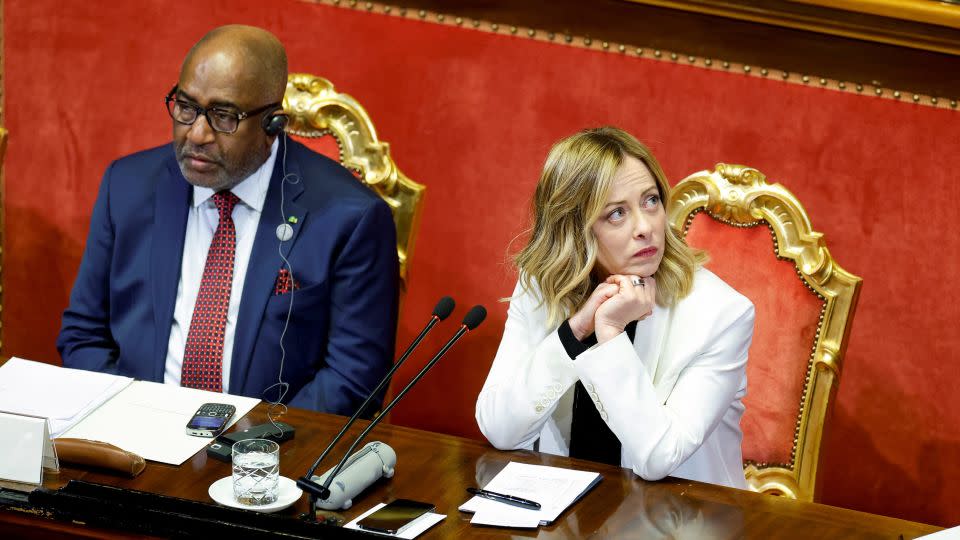Meloni’s plan to boost Africa growth criticized for leaving out continent’s leaders
Italian Prime Minister Giorgia Meloni’s first major event of Italy’s G7 presidency got off to a rocky start after the cornerstone plan of her summit on Africa was criticized for failing to include African nations in its planning.
Two dozen African leaders, along with Ursula Von Der Leyen and other European officials and United Nations and World Bank officials, met in Rome late Sunday and all day Monday for the event during which Meloni unveiled the “Mattei Plan,” named after Italy’s state-owned oil giant Eni founder Enrico Mattei.
‘An approach of equals’
“The basis of the Mattei Plan is a new approach: non-predatory, non-paternalistic, but also not charitable,” Meloni said in a post on X ahead of Monday’s event. “It’s an approach of equals, to grow together.”
The plan, which includes more than €5.5 billion ($6 billion) in investments, credits, gift operations, and guarantees — including building a training center on renewable energy in Morocco, education projects in Tunisia, and other projects in Algeria, Mozambique, Egypt, the Republic of Congo, Ethiopia and Kenya — was not well received by the African leaders in attendance, who said that they had not been consulted in the formation of the plan.
Italy’s financial contribution will come from the Italian climate fund and the country’s development cooperation fund. The payoff for Italy will be a slowdown in irregular migration from African nations and to help alleviate Europe’s (and especially Italy’s) dependence on Russian oil.
African Union Commission Chairman and former Prime Minister of Chad Moussa Faki Mahamat responded to the promises Meloni laid out with skepticism.
“African countries would have liked to have been consulted before Italy rolled out its plan,” he said during his address on Monday. “We cannot be happy with promises that are never maintained.”
He also said any agreement needed to be made on liberty and consensus with no party imposing anything on the other.
Italy’s first African-born parliamentarian Aboubakar Soumahoro, who is deputy and coordinator of the parliamentary intergroup for Sub-Saharan Africa, also criticized the plan.
“At the Italy-Africa summit, where the so-called Mattei Plan written by the Italian government for Africa without consulting Africans is being discussed, the absence of the countries of greatest origin of Sub-Saharan African immigrants weighs heavily,” he said.

“As I reiterate, unheeded for a year, Africa, a continent with around 800 million young people under 25, needs a fair and supportive partnership.”
He said his group plans to offer a counterplan that takes into consideration plans already in place.
CNN has reached out to both the Italian prime minister’s office and foreign office regarding the criticisms. Both declined to comment.
Importing energy from Africa
Meloni envisions Italy as a European hub to import energy from Africa via a pipeline and distribute it throughout Europe, which is a plan that was first introduced by former PM Silvio Berlusconi when he sought to curb irregular immigration from Libya. The plan fell apart after Libyan dictator Moammar Gadhafi was deposed in 2011.
“We want to free up African energy to guarantee younger generations a right which to date has been denied,” Meloni said. “Because here in Europe we talk a lot about the right to emigrate, but we rarely talk about guaranteeing the right to not be forced to emigrate.”
European Commission President Ursula Von Der Leyen, who also attended, expressed her gratitude to Italy for the plan. “The new Mattei Plan represents an important contribution to this new phase of our partnership with Africa and integrates with our European Global Gateway, 150 billion euros from the EU,” she said.
Roberta Metsola, president of the European Parliament echoed Von Der Leyen’s sentiment. “The Mattei plan is good, if Africa prospers the EU prospers,” she said, underscoring how the plan addresses “a real, long overdue change of mentality” in relations with Africa.
Meloni, who won power in 2022 on an anti-immigration platform and who previously rallied for a naval blockade to stop migrant boats, is also facing heavy resistance from her right-wing colleagues in Europe.
During her reign as Italy’s leader, the number of people arriving by sea in Italy rose from 105,000 in 2022 to more than 158,000 in 2023, the first full year of her premiership.
The fine print of the Mattei plan also includes African cooperation in blocking migrant boats from leaving African shores and for speedier repatriation of migrants who arrive in Italy by sea without applying for asylum first.
Others, including Dean Bhekumuzi Bhebhe, head of “Don’t Gas Africa,” a civil society group , called Meloni’s plan “blind ambition” which disregards the climate crisis by focusing on fossil fuels.
A group of 40 African civil society organizations who make up part of “Don’t Gas Africa,” also signed a letter warning the plan’s “principal objective is to expand Italy’s access to Africa’s fossil gas for Europe and strengthen Italian companies’ role in exploiting Africa’s natural and human resources.”
For more CNN news and newsletters create an account at CNN.com


